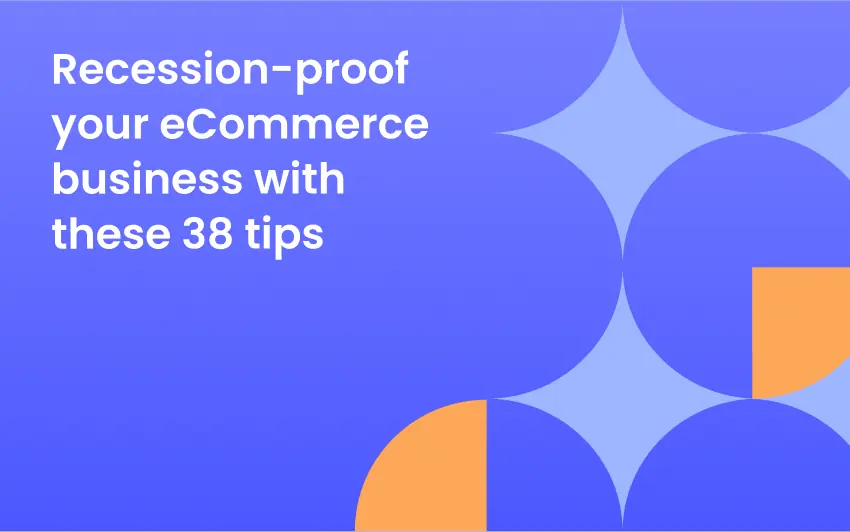- Invest in Your Best-Selling Products
- Optimize Your Supply Chain
- Cut Costs By Negotiating and Streamlining
- Build a Strong Brand
- Retarget Existing Customers
- Analyze and Monitor Campaign Performance
- Listen and Adapt to Your Customers Needs
- Look for New Ways to Give Value to Customers
- Keep Creating Value-Generating Content
- Encourage Employees to Advocate for Your Brand
- Bet on Neuromarketing
- Boost Your Marketing and Promotion Efforts
- Focus on Brand Recognition
- Make Use of Partnerships to Improve Service
- Keep Operations Lean
- Experiment With Cross-Border Shipping
- Reduce Excess Inventory
- Shift Your Acquisition Strategy
- Diversify Your Product Offerings
- Make a Plan for a Sales Slow Down
- Invest in SEO
- Extend Your Reach With Social Media
- Grow Sales Volume With Discounts and Promotions
- Outsource Tasks to Reduce Need for Hiring
- Build Authority With a Content Flywheel
- Focus On Boosting AOV to Offset Lower Sales Volume
- Optimize Your Technology Stack
- Utilize Third Parties Effectively
- Own Your Customer Relationship
- Identify Your Unique Selling Point
- Revamp Your Website
- Focus On Information-Rich Content
- Keep Improving Your Delivery Experience
- Consider Bundling Products
- Revisit Your Pricing Strategies
- Under-Promise and Over-Deliver
- Keep Overhead Costs Low
- Automate and Streamline
- Automate and Streamline
The economic forecast is showing signs of consistent decline, which has most experts predicting a recession by the end of 2023.
Is your eCommerce business prepared for a recession? Rising costs due to inflation, a housing crisis, stock and crypto crashes, global conflict, and lingering impacts from COVID-19 are culminating together to create uncertainty in the economic sector. Most experts predict that we will enter a recession by late 2023, and it could come even earlier. As a business owner, this means that it’s time to look at your books and come up with a recession-proof strategy for your eCommerce store.
8fig is a growth funding platform designed to scale your eCommerce business in any economic climate. Our flexible Growth Plans let you adapt your business and cash flow to real-time demands, allowing you to stay nimble during times of rapid change.
We’re passionate about helping you forge a future without limits, so we’ve sourced expert advice from eCommerce store founders and service providers on how to survive a recession.
A recession’s potential impact on eCommerce
For eCommerce business owners, the economy plays a major role in both consumer habits and operating costs. Wondering how big of an impact a recession could have on your business? Historical data shows us that the costs of a recession are major. During the 2008 financial crisis and recession, a whopping 1.8 million small businesses closed their doors.
Inflation and fuel hikes are causing eCommerce operation costs to go up, which means running your business is more expensive. Amazon store owners are paying a 5% temporary surcharge thanks to inflation and fuel hikes, and shipping costs are also inflated. Add in global conflict and manufacturing shutdowns in China due to COVID-19 and you’ve got a challenging market to try to remain profitable in.
To top it all off, consumer spending declines during times of recession. This is due to the fact that consumers have less disposable income. Consumers in all income brackets are more likely to put off or cut back on discretionary purchases. Business owners should therefore make sure to prepare and create a plan in advance when a recession seems to be around the corner.
We talked with 38 experts in eCommerce about how to recession-proof your business. Here are their tips.
1. Invest in Your Best-Selling Products
Subscribe to the eCommerce newsletter for
top industry insights

It’s important to cut costs and conserve capital during a recession. That’s why Mark Valderrama, CEO and founder of popular Aquatics e-store Aquarium Store Depot, recommends focusing on your best-selling products.
“During a recession, you will need to conserve wherever possible and prioritize opportunities with the highest return on investment.” he said.
While you may be tempted to market a variety of products in order to appeal to more customers, a recession isn’t the best time to do that. Instead, “consider which products are the most popular with your consumers, and consider halting the promotion of other products.” This will keep you from using your whole advertising budget on products that don’t sell well.
However, if you notice increased competition among large competitors for that product, you might want to stay out of it. “Then, find the goods that they are ignoring and focus on those instead.”
2. Optimize Your Supply Chain

A flexible and efficient supply chain is a great way to make sure you keep costs down, even during the best of times. During a recession, optimizing your supply chain becomes even more important, since higher fuel prices and shipping costs can funnel needed capital out of other aspects of your business.
“First, optimize your supply chain to ensure you’re getting the best possible prices from your suppliers. This will help you keep costs down and margins high,” advised Robart Johnson, director of operations of My Wood Rings, an eCommerce company that sells wood rings for men.
Since people are often looking for deals during a recession, it’s also a good time to include promotions in your marketing strategy.. “Don’t be afraid to experiment with new pricing models or product offerings. A recession is a perfect time to try something new and see what works for your business.”
3. Cut Costs By Negotiating and Streamlining
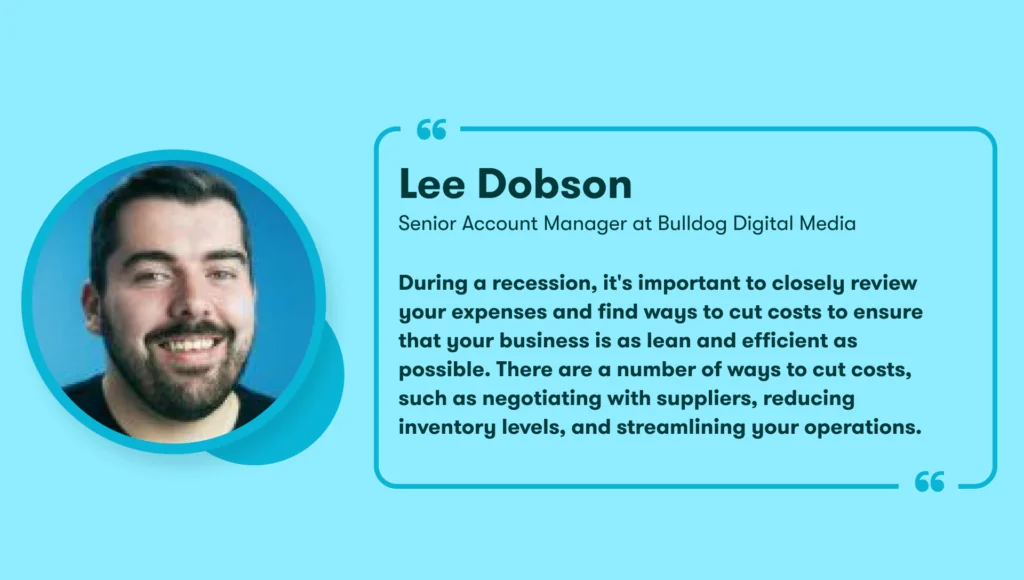
With higher expenses across the board during a recession, it’s no secret that cutting costs should be a main goal when it comes to eCommerce. However, many sellers and businesses are unknowingly spending more than they need to. Lee Dobson, senior account manager at eCommerce marketing agency Bulldog Digital Media, suggests several ways to cut back.
He recommended that you “closely review your expenses and find ways to cut costs” in order to make sure your business is running effectively.
“This will help to ensure that your business is as lean and efficient as possible,” he added. “There are a number of ways to cut costs, such as negotiating with suppliers, reducing inventory levels, and streamlining your operations.”
You may be surprised by how much money you can save in these simple ways.
4. Build a Strong Brand

In order to keep your business up and running during a recession, it’s important to communicate well with consumers. Expert brand ambassador and co-founder of digital marketing agency SEM Dynamics Masha Mahdavi says that creating a strong brand is the way to go.
“When we say a strong brand, it is the foundation on which everything else is built,” she said. Businesses that do well during recessions are those that succeed in connecting with customers. Those are the brands that people keep coming back to, even when times are tough.
“Most of the firms that have been able to effectively communicate are those that continue to perform well during a recession,” clarified Masha. “They have a clear identity which helps them form a connection with customers. But then you must still show your customers how your products are better than your competitors.”
Make sure to continue to produce a high quality product, and use brand storytelling to show your customers why they should buy from you.
5. Retarget Existing Customers
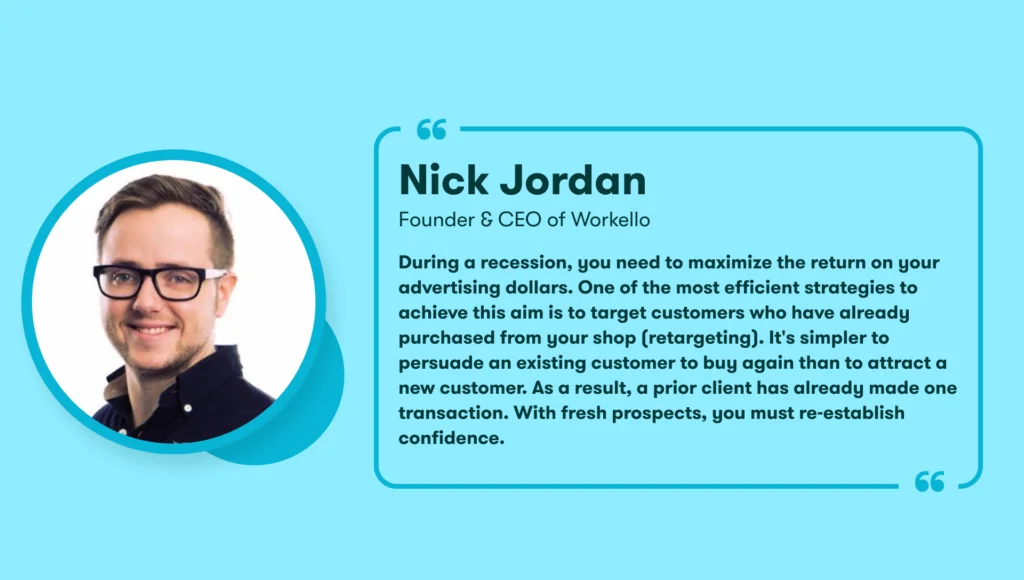
Doing well during a recession requires businesses to make sure they’re spending their capital wisely. Nick Jordan, founder and CEO of Workello, suggests focusing on advertising.
“During a recession, you need to maximize the return on your advertising dollars. One of the most efficient strategies to achieve this aim is to target customers who have already purchased from your shop (retargeting),” he said. “It’s simpler to persuade an existing customer to buy again than it is to attract a new one. As a result, a prior client has already made one transaction. With fresh prospects, you must re-establish confidence.”
Nurturing existing customers and turning them into repeat customers is cheaper than bringing in new customers. They have already expressed confidence in your product and are thus more likely to buy again. Try out loyalty programs and personalization in order to reach out to existing customers.
6. Analyze and Monitor Campaign Performance

You never want to spend money on campaigns that aren’t working. During a recession, it’s a good idea to check on the performance of your marketing campaigns to make sure that the money you’re spending is really helping you out.
Benjamin Stenson, owner of Norsemen Home Remodeling, uses Google Analytics and other reporting tools from eCommerce platforms to analyze and monitor his campaign performance.
“Tracking the efficacy of your campaigns is a great way to maximize your marketing expenditure so you’ll know which advertisements to discontinue to save money and which efforts are worthwhile,” he advised. “Use Google Analytics in addition to the analytics reports supplied by Shopify, BigCommerce, or whichever eCommerce platform you use. The Page Value measure in Google Analytics shows you how much each page on your site contributes to revenue.”
7. Listen and Adapt to Your Customers Needs
Popular content
- 14 strategies to improve your eCommerce business’s financial health
- 50+ ChatGPT prompts to elevate your eCommerce business
- A guide to pricing your product on Amazon
- 5 marketing metrics all eCommerce businesses should track
- All about Amazon PPC
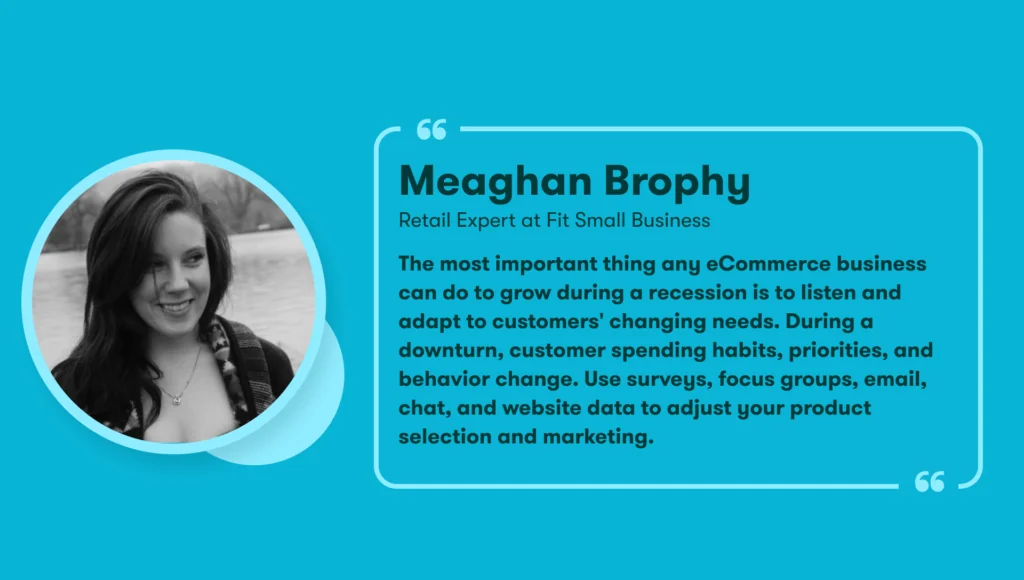
If your customers are happy, you’re more likely to succeed. This is always true, but during a recession, consumers reevaluate their purchases. Listening to their wants and needs can give you useful insights into how to continue selling.
In fact, retail expert Meaghan Brophy, who advises small businesses at Fit Small Business, believes that paying attention to customers is critical during a recession.
“The most important thing an eCommerce business can do to grow during a recession is to listen and adapt to customers’ changing needs,” she said. “During a downturn, customer spending habits, priorities, and behavior change. Use surveys, focus groups, and email, chat, and website data to adjust your product selection and marketing,” she recommends.
8. Look for New Ways to Give Value to Customers
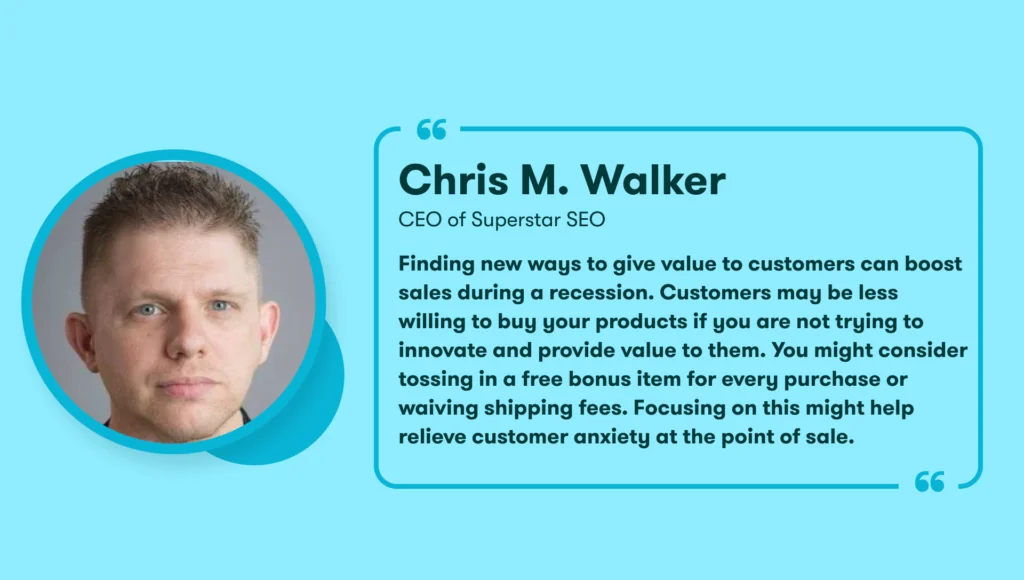
During tough times, consumers are always looking for ways to make their money do more for them. Since they have less disposable income, they look for good deals and incentives when they make a purchase. In order to make your offer more attractive to customers during a recession, seek out new ways to add value.
“Finding new ways to give value to customers can boost sales during a recession,” explained Chris M. Walker, CEO of Superstar SEO, who helps SEO specialists and digital marketers succeed. “Customers may be less willing to buy your products if you are not trying to innovate and provide value to them. You might consider tossing in a free bonus item for every purchase or waiving shipping fees.”
When customers feel like they’re getting something extra out of the deal, they will feel less anxious clicking the “buy” button.
9. Keep Creating Value-Generating Content

“Content reigns supreme,” claims Kenny Kline, president and financial lead at BarBend, a sports and fitness content outlet. He recommends content marketing as a way to combat hard times due to a recession.
“Even though it does not cost consumers anything to read your content, the payback for your organization can be enormous if you are able to establish yourself as a trusted market resource,” he said. If you get your name out there, consumers will be more likely to make a purchase. It will also drive traffic to your site.
“Develop a Content Marketing plan that focuses on issues of interest to your audience to increase search engine traffic and drive a daily influx of free clients to your offerings.”
10. Encourage Employees to Advocate for Your Brand
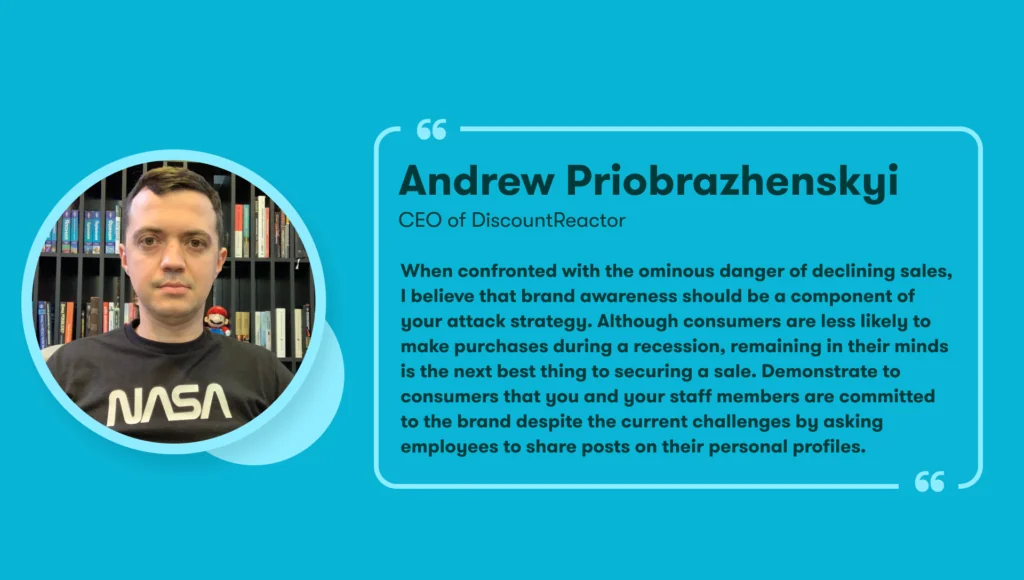
Keeping your brand in consumers’ minds during a recession can help you weather the storm. CEO Andrew Priobrazhenskyi discussed his strategy of advocating for his brand, DiscountReactor, when times are hard.
“When confronted with the ominous danger of declining sales, I believe that brand awareness should be a component of your attack strategy,” he advised. “Although consumers are less likely to make purchases during a recession, remaining in their minds is the next best thing to securing a sale.”
It’s also a good idea to have employees continue to promote the brand, particularly on social media. This shows loyalty and commitment, and will help boost the brand’s value in the eyes of consumers. “Attracting attention to your business on personal profiles not only increases the frequency with which your company is discussed, but also demonstrates to consumers that you and your staff members are committed to the brand despite the current challenges.”
11. Bet on Neuromarketing

Neuromarketing is the study of consumer physiological reactions to gain an understanding of their preferences and decision-making processes. ECommerce consultant and founder of public records search engine BestPeopleFinder Ronald Williams regards neuromarketing as a valuable tool in overcoming the challenges of a recession.
Using neuromarketing, businesses can get insight into customers’ motivation. ““I believe neuromarketing is a much-neglected area by eCommerce store founders to fight the predicted recession,” he said “Today’s consumer has different behavior, interest, and habits. With neuromarketing, you can identify these areas more efficiently and thus can make strategies that are relevant to consumers’ needs and can help in attracting new customers and retaining the existing customers.”
Sellers can use this information to shift their strategy in order to market products that fit consumer needs. This will help them remain relevant and competitive even during economic downturn.
12. Boost Your Marketing and Promotion Efforts

Sometimes, doing the opposite of what everyone else is doing can be a good strategy for success. Adam Wood, co-founder of RevenueGeeks, a website that covers eCommerce and Amazon selling tips, uses this strategy when it comes to marketing during a recession.
While many other businesses cut costs by minimizing marketing and advertising expenditures, he puts more money into promotion efforts. Consumers are more likely to see your advertisements and purchase your products when there are fewer marketing campaigns from competitors.
“During a recession, the majority of other firms, including competitors, will reduce their marketing and advertising spending. Opportunity!” he urged. “This is the moment when smart companies beef up their marketing and advertising campaigns in order to stay ahead of their competitors, who are simultaneously cutting and driving their businesses into the ground.
13. Focus on Brand Recognition

We’ve already discussed how building your brand is a great tool during a recession. Alex Smith, CEO of Lucky Bobbleheads, an eCommerce brand that sells handmade custom bobbleheads, takes this a step further with brand recognition.
“A great brand serves as the foundation on which everything else is constructed, and it should be respected,” he said. “Companies who are able to successfully communicate what differentiates them from their competition are those that are able to maintain strong performance during a recession.”
Make sure to set your brand apart from everyone else. Focus on ways to make your brand stand out, and customers will remember you. A strong brand identity “aids in the formation of emotional connections with clients.” That leads to sales, even during a recession.
14. Make Use of Partnerships to Improve Service
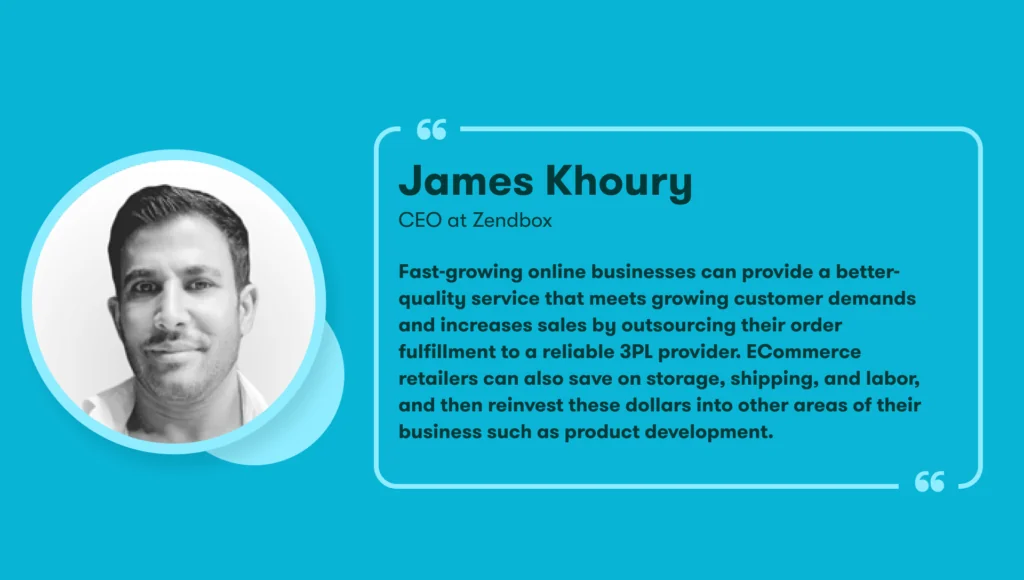
In order to remain competitive during a recession, it’s vital that you offer high quality service. Consumers are likely going to be pickier when choosing where to buy goods, so make sure you’re providing reliable service that beats your competitors.
According to James Khoury of Zendbox, an eCommerce fulfillment solution, outsourcing order fulfillment to a 3PL (third party logistics) provider is a great way to make sure your service is top notch. You’ll be able to meet customer shipping expectations, which will give your business a boost.
Another benefit is that 3PLs often have the connections and know-how to pivot during times of disruption and delay, saving you a lot of stress and headache. You might even save some money by outsourcing order fulfillment.
“Fast-growing online businesses can provide a better-quality service that meets growing customer demands and increases sales by outsourcing their order fulfillment to a reliable 3PL provider,” advised James. “ECommerce retailers can also save on the cost of storage, shipping, and labor, which can be reinvested back into other areas of their business such as product development.”
15. Keep Operations Lean
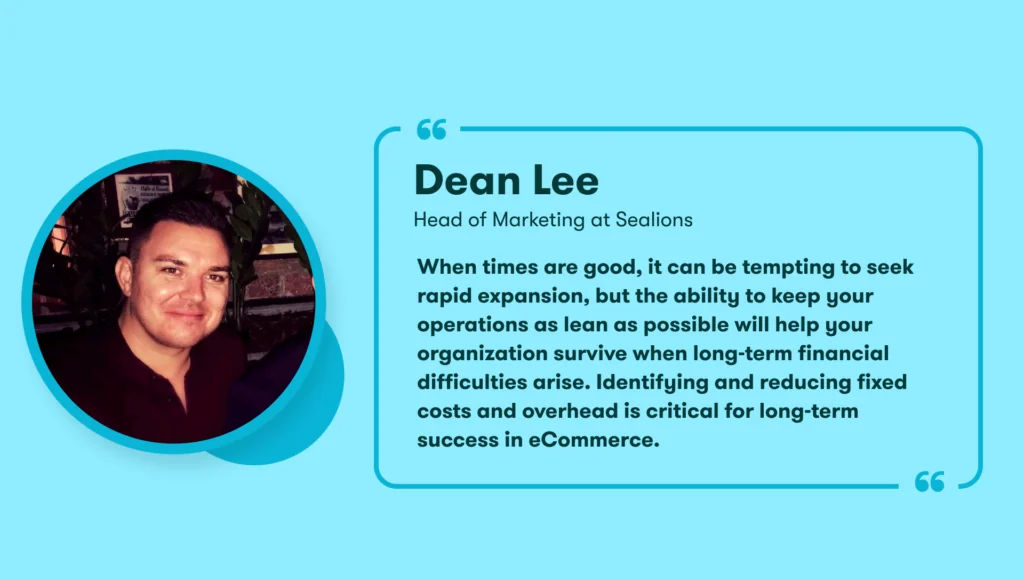
Dean Lee, head of marketing at supplement and vitamin company Sealions, keeps his business ready for a slump by planning ahead. “When times are good, it can be tempting to seek rapid expansion, but eCommerce businesses should always have an eye on the future,” he said.
Maintaining efficient operations is a great way to prepare your business for anything, and can help you survive a recession. “The ability to keep your operations as lean as possible will help your organization survive when long-term financial difficulties arise,” he added. “Identifying and reducing fixed costs and overhead is critical for long-term success.”
Save money where you can at all points in your supply chain. Continuously monitor and analyze your costs to see where you might be spending too much. Then, you can cut back and keep your spending in check.
16. Experiment With Cross-Border Shipping
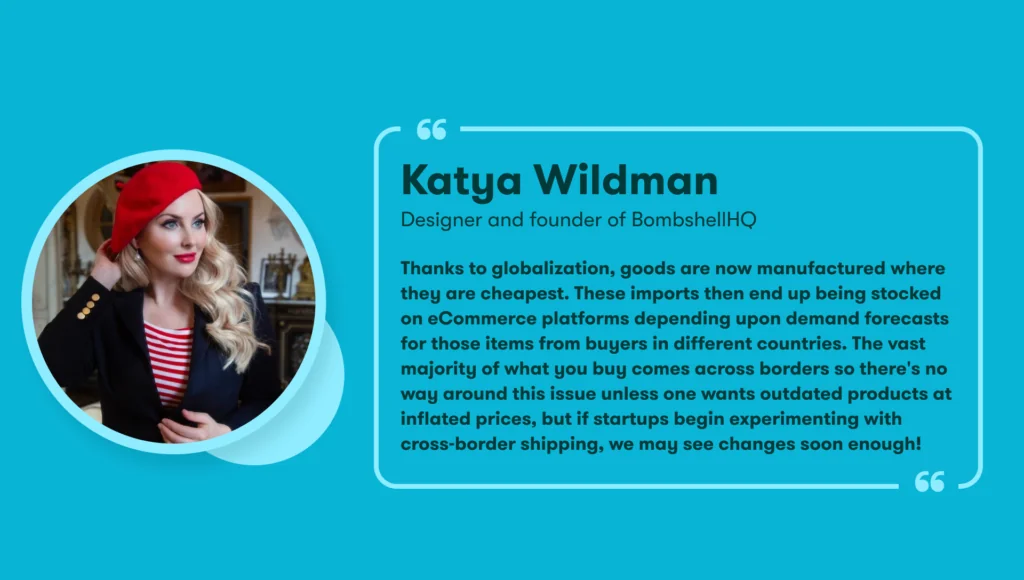
There’s no getting around the realities of globalization, according to designer and founder of clothing brand BombshellHQ, Katya Wildman. She advised giving cross border shipping a try during times of recession.
Most eCommerce sellers import items from overseas, where they are cheapest, and stock their inventory in warehouses in their home country. “Thanks to globalization, goods are now manufactured where they are cheapest,” said Katya. “These imports then end up being stocked on eCommerce platforms depending upon demand forecasts for those items from buyers in different countries.”
This whole process can be unpredictable and costly. It depends a great deal on maintaining the ideal level of inventory based on predicted demand. During a recession demand goes down, making things more difficult. “The vast majority of what you buy comes across borders so there’s no way around this issue unless one wants outdated products at inflated prices, but if startups begin experimenting with cross-border shipping, we may see changes soon enough!”
Cross border shipping, or shipping your product overseas, is a way around this dilemma. It allows you to expand your market and seek out new customers .
17. Reduce Excess Inventory
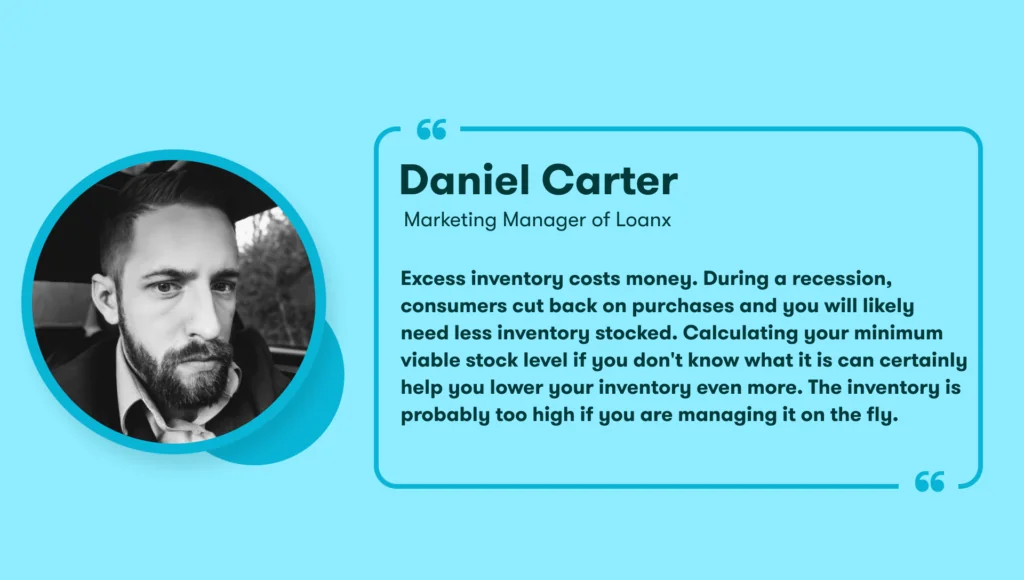
When demand is high, maintaining excess inventory can help prevent stockouts. During a recession, however, demand goes down. That means you’ll need less inventory. Daniel Carter, marketing manager of specialist bridging loan broker Loanx, recommends reducing excess inventory when a recession hits. It’s a quick way to save money, everyone’s goal during a recession.
“Excess inventory costs money,” he asserted. “You will not require your existing amounts of inventory during a recession, therefore cut them.”
Then, figure out how much inventory you actually need and stick to it. “Calculating your minimum viable stock level, if you don’t know what it is, can certainly help you lower your inventory even more. The inventory is probably too high if you are managing it on the fly.”
18. Shift Your Acquisition Strategy
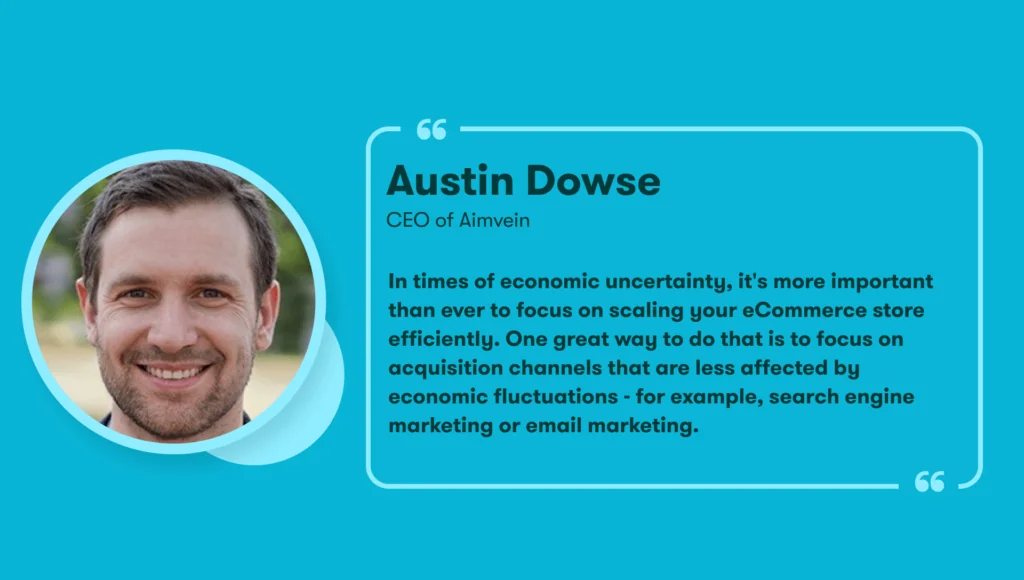
Customer acquisition is an important part of your eCommerce business. During a recession, however, certain acquisition channels are affected and it’s wise to change your strategy.
Austin Dowse, CEO of medical device company Aimvein, makes sure to scale his business efficiently during economic downturns. “In times of economic uncertainty, it’s more important than ever to focus on scaling your eCommerce store efficiently,” he said. “One great way to do that is to focus on acquisition channels that are less affected by economic fluctuations – for example, search engine marketing or email marketing.”
That way, you can still grow your business and acquire new customers without wasting valuable capital on acquisition strategies that aren’t working.
19. Diversify Your Product Offerings

Robin Brown, CEO of lapel pin company Vivipins, makes sure to pay extra attention to efficiency and optimizing his business during a recession.
“The key to scaling your eCommerce store during a recession is to focus on efficiency and optimization,” he recommended. “Make sure your supply chain is as lean and efficient as possible, and that you’re getting the most out of your marketing budget.”
He also recommends diversifying. Consumers’ buying habits change during economic downturns, so expanding your product range can help you attract a larger audience and keep selling. “You may also want to consider diversifying your product offerings to appeal to a wider range of consumers,” he said.
20. Make a Plan for a Sales Slow Down
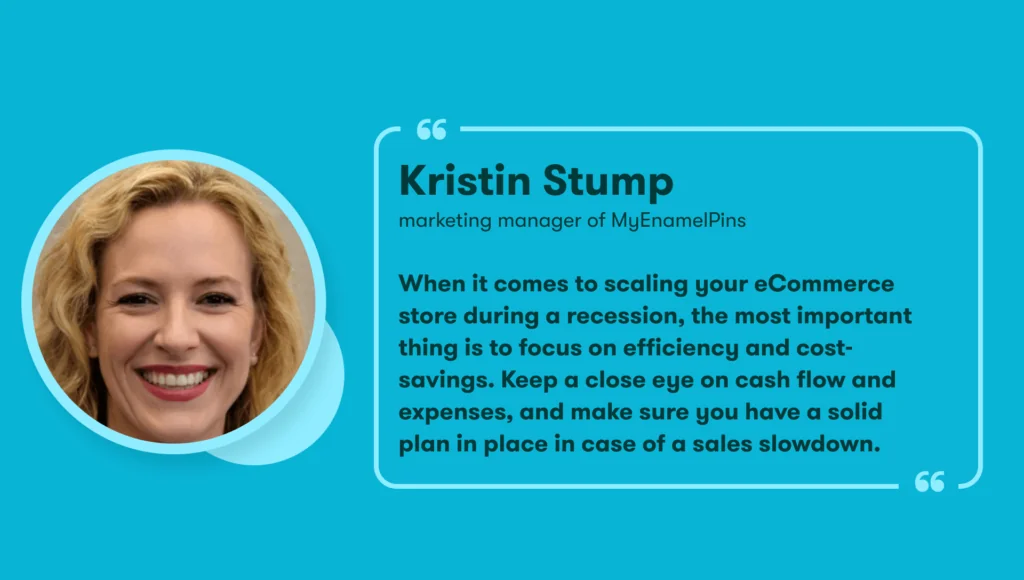
Planning ahead for inevitable economic slowdowns is a must for eCommerce sellers. Kristin Stump, marketing manager of enamel pin company MyEnamelPins, pays close attention to cash flow and expenses at all times. Using this information, she plans ahead for inevitable times of economic uncertainty.
“When it comes to scaling your eCommerce store during a recession, the most important thing is to focus on efficiency and cost-savings,” she said. “Keep a close eye on cash flow and expenses, and make sure you have a solid plan in place in case of a sales slowdown.”
She also advises sellers to “review your marketing spend and optimize campaigns for maximum ROI,” as well as to look for ways to streamline supply chain operations to reduce costs.
21. Invest in SEO

In order to continue attracting traffic to his store during a recession, Niall John Lynchehaun, managing director of Midland Stone, an eCommerce brand that sells natural stone products, invests in SEO. “SEO has helped us ride out many ups and downs in the economy and we will continue to rely on it,” he said. “It’s much more cost-efficient and will allow you to get traffic even when you are not actively working on it.”
Since many people who may want your product won’t be able to afford it during difficult economic times, using targeted marketing campaigns isn’t as effective.
Using Google and search engine optimization, however, “will keep you bringing prospective customers that are actively searching for products in your niche.” It will drive those who are ready to buy your product to your site, when times are good as well as during a recession.
22. Extend Your Reach With Social Media

Social media is a great way to grow your reach, an important goal during a recession. Alex Williams, CFO of FindThisBest LLC, told us that building a strong social media presence is his number one advice for growing your business during a recession. His company, which provides consumers with reliable and up-to-date information about various products, uses this strategy.
“My number one advice for growing an online business during a recession is to build a strong social media presence,” he advised. “This is very affordable and ensures that you reach out to a larger audience.”
Content matters, however, so do your research and spend time developing high quality creatives. “Make sure to create compelling content with captivating visuals, and remember to engage with your customers,” said Alex.
A good social media strategy can help you attract new customers and boost sales, even during an economic downturn.
23. Grow Sales Volume With Discounts and Promotions
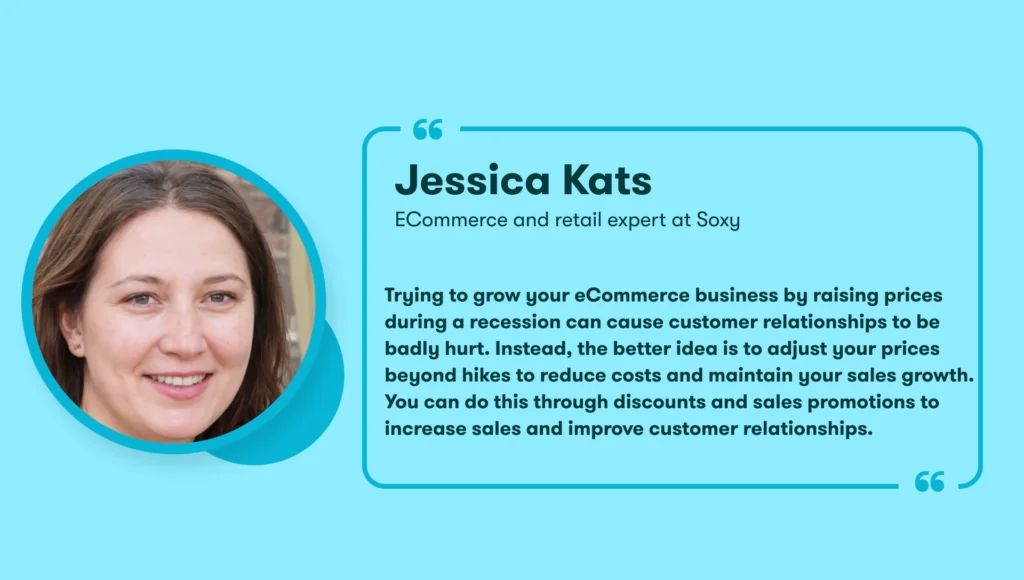
Everyone is looking for good deals and special offers, particularly during a recession. Since consumers have less disposable income, they’re bound to be more careful with their purchases.
If they spot a good deal or a special offer, however, they’ll be more likely to go ahead and buy your product. That’s why eCommerce and retail expert Jessica Kats, suggested adjusting prices and offering discounts and sales promotions. Through her experience at retail website Soxy, she has seen the value of special offers.
“Trying to grow your eCommerce business by raising prices during a recession can cause customer relationships to be badly hurt,” she explained. “Instead, the better idea is to adjust your prices beyond hikes to reduce costs and maintain your sales growth. This can be done through discounts and sales promotions to increase sales and improve customer relationships.”
Satisfied customers can go a long way toward helping your business. Plus, the relationships that you build during a recession can also benefit your business once the economy improves.
24. Outsource Tasks to Reduce Need for Hiring

Reducing overhead expenses is the way to go during a recession. You want to keep your costs as low as possible in order to grow your profits even when consumers are making fewer purchases.
Aviad Faruz, CEO at jewelry company Faruzo, outsources tasks in order to lower overhead costs. “You can grow your business during a recession by reducing overhead expenses,” he affirmed. “Brands can use the option of drop-shipping as they would no longer have to spend on warehouse storage expenses. You can also outsource tasks which would help reduce the cost of hiring and onboarding employees.”
There are many options for outsourcing labor, and they can take a lot of complex, expensive, and time-consuming tasks off of sellers. Consider looking into partnerships and outsourcing opportunities in order to prepare for a recession.
25. Build Authority With a Content Flywheel

Consumers are more likely to make purchases from brands they trust, particularly during a recession. Therefore, Marc Bromhall, founder of surf product brand Surf Gear Lab, suggests spending some time building brand authority.
“My best advice is to build authority within your customer groups across all the relevant socials,” he said. “This could be Reddit, Facebook, Instagram or Twitter. It’s inexpensive, forms part of the content marketing flywheel, and most importantly brings in revenue in perpetuity.”
Investing in a content marketing strategy takes some time, but it’s a cost-effective way to build brand authority and increase your following on social media. It drives customers to your site and leads to more engagement and conversions.
26. Focus On Boosting AOV to Offset Lower Sales Volume

Since your sales volume will likely drop during a recession, it’s a good idea to make extra money anywhere you can. Marketing lead at upselling and cross-selling firm ReConvert.io and former 6-figure eCommerce entrepreneur Fintan Meagher focuses on his company’s AOV, or average order value.
“To offset a dwindling profit margin, it’s essential to focus on increasing the value of each sale you do make,” he said. He described some of the ways he has been able to increase AOV in the past, such as encouraging customers to buy a complementary or related product in addition to their initial purchase.
“One of the best (and easiest) ways to achieve this is to add personalized cross-sells to your store. No matter what platform your store runs on, there’s heaps of solutions to help you add compelling cross-sell and upsell offers to your sales funnel.”
27. Optimize Your Technology Stack

Another way to cut costs during a recession is to take a look at your technology stack. That’s what Marc Bishop, director of business growth at iDigiMagnet recommends.
“Even the leanest businesses are likely to have redundant technology in their tech stacks, so conduct a thorough inventory of all the technology your business employs to operate,” he advised. “You will probably discover services you no longer require and contracts that you may be able to negotiate for a lower price.”
It’s a simple and painless way to streamline your operations and cut costs. Keeping things efficient and eliminating services you don’t need is immensely beneficial to your business. It’s just the kind of thing that can help your business significantly during a recession.
28. Utilize Third Parties Effectively

Partnering with third parties is a great way to improve service and increase your business’ efficiency. 3PL (third party logistics) providers, shipping partners, and other third party services can take a load off of sellers’ minds and save money. During a recession, however, it’s a good idea to make sure you are working with them effectively.
Co-founder, designer, and marketing manager of photographic backdrop company Foxbackdrop Sina Will uses this strategy to optimize her business during economic downturn. “Conduct a thorough and extensive study of the third parties you now employ – can you reduce any redundancies?” she asked.
“You may also find a few areas where tasks now conducted in-house can be managed by third-party providers more efficiently and effectively. This type of analysis and realignment can increase earnings by making the company simpler, more cost-effective, and more affordable.”
29. Own Your Customer Relationship

If you’re an eCommerce seller, you already know the importance of customer relationships. During a recession, owning your customer relationships can help keep sales up.
Former Shopify store manager and current CEO of eCommerce advertising agency WunderAds Marco Grishaber encourages sellers to use emails to foster your customer relationship. “Focus on acquiring high-quality emails as you want to own the customer relationship instead of purely focusing on acquisition campaigns,” he said.
He also recommended diversifying paid ad campaigns in order to cut costs and reach a wider audience. “To scale an eCom business from 7 to 8-figures and beyond it’s necessary to focus on paid ads diversification into channels like TikTok and YouTube since Facebook has become significantly more expensive.”
30. Identify Your Unique Selling Point

Setting your business apart is a great way to make sure consumers continue to make purchases during a recession. If there is something specific that customers love about your product, you’ll be able to keep attracting customers.
This is just what Zarina Bahadur, CEO and founder of 123 Baby Box, an eCommerce company that sells personalized, curated subscription boxes for babies, advised. “See what customers are loving about you, focus on that particular thing and enhance it. This differentiation is more likely to attract new customers even during a recession.”
In order to keep customers coming back, it’s also a good idea to provide incentives. “Show your current customers that you value them,” said Zarina. While it is a little tricky to offer discounts and offers in times of a recession, you can still offer free trials and freemium.”
31. Revamp Your Website
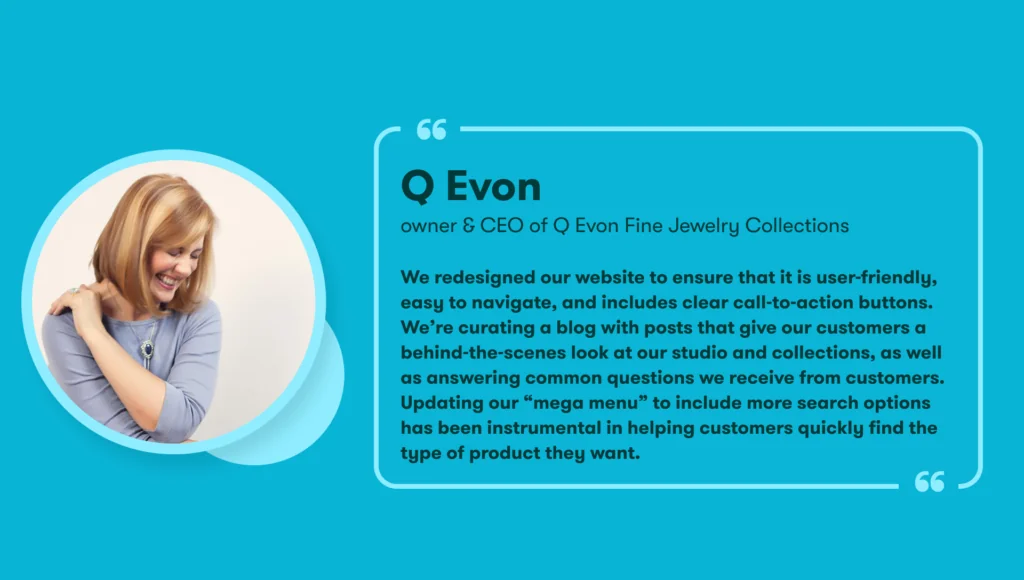
Your website is a crucial part of your eCommerce business. When seeking items to purchase, consumers want a user friendly, clear experience. If the information is not understandable or the process is unnecessarily complex, people might abandon their cart in favor of a simpler option.
This is why Q Evon, owner and CEO of Q Evon Fine Jewelry Collections, redesigned her website in preparation for a recession. “We redesigned our website to ensure that it is user friendly, easy to navigate and includes clear call to action buttons,” she explained. “We’re curating a blog with posts that give our customers a behind the scenes look at our studio and collections, as well as answering common questions we receive from customers. Updating our ‘mega menu’ to include more search options has been instrumental in helping customers quickly find the type of product they want.”
When customers can more easily navigate your website and find answers to their questions, you’re more likely to get conversions.
32. Focus On Information-Rich Content

ECommerce sellers want to keep driving traffic to their websites during a recession, and that can be a challenge. One worthwhile way to do that is through information-rich, high quality content. When people are able to gain information from trustworthy content, they’ll be more likely to visit your store and make a purchase.
“During a recession, more than at any other time, consumers are looking to get the best value for their money,” Cody Candee, founder and CEO of Bounce, a luggage storage service, pointed out. “An established way to generate that value, as well as drive traffic to your website, is through quality content.”
Potential customers will view your business as more reliable and feel more secure in their purchases when you offer well-researched content.
“Providing content rich newsletters, emails, and ecommerce website pages establishes authority, which activates Google algorithms for SEO. By focusing on creating information-rich content, not only will it provide value that will attract customers, but drive greater customer traffic to your eCommerce store.”
33. Keep Improving Your Delivery Experience
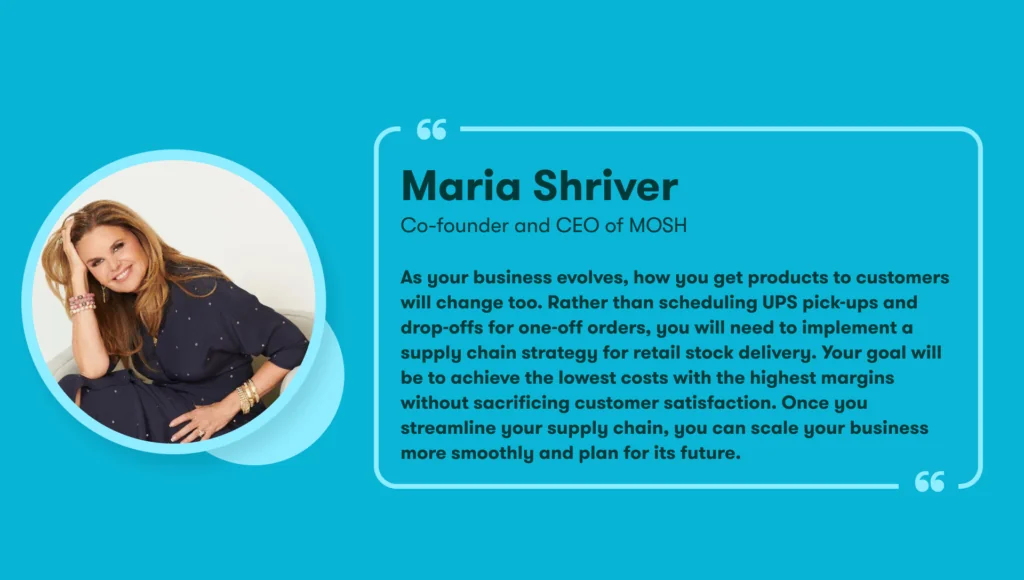
The delivery experience is a critical component of your eCommerce business. Maria Shriver recently co-founded MOSH, a company that sells nutritious protein bars, and now serves as the company’s CEO. She advised optimizing your supply chain in order to improve your delivery experience during a recession.
“As your business evolves, how you get products to customers will too,” she said. “Rather than scheduling UPS pick-ups and drop-offs for one-off orders, you will need to implement a supply chain strategy for retail stock delivery.”
Improving your delivery strategy can improve service and cut costs simultaneously, a huge benefit for any business.
“Your goal will be to achieve the lowest costs with the highest margins without sacrificing customer satisfaction. Once you streamline your supply chain, you can scale your business more smoothly and plan for its future.”
34. Consider Bundling Products

It’s no secret that consumer buying habits change during a recession. According to Yuvi Alpert, founder and CEO of Noémie, a fine jewelry company, you can use that information to your advantage.
“During recessions, consumers will shop based on a preset spending amount,” he explained. “So instead of focusing on selling a particular product, the goal should be to get as close to that amount as possible, and you can accomplish this through bundling.”
Customers are ready to spend a specific amount of money, and if you can figure out that sum and build offers that are as close as possible to that price, you’ll be able to maximize profits. He suggested doing research and bundling products in order to do so.
“Lowering the prices on products may encourage a buy, but still leaves money on the table. By researching to establish the most likely spending points, and then bundling products to get as close to that amount as possible, you can get the most from each sale, while creating value for your customers.”
35. Revisit Your Pricing Strategies

Richard Clews is founder and chief pants officer at Pants and Socks, a company that sells, you guessed it, pants and socks. He was able to build a consistent clientele during the COVID-19 pandemic by appealing to consumer desires. Since people are more hesitant to spend money, they’ll respond particularly well to special offers.
“During a recession, your customers are most likely going to be nervous about spending,” said Richard. “They will be more inclined towards making savings, and will respond far more to good deals and special offers than they might in times of stability and prosperity.”
Once you establish a feeling of trust with your customers, they’ll continue to purchase from you and you can even grow your business during challenging economic times.
“We won over our loyal customer base during COVID-19 by using crisis to our advantage, offering them special offers and discounted prices at the time when they needed them the most,”
36. Under-Promise and Over-Deliver
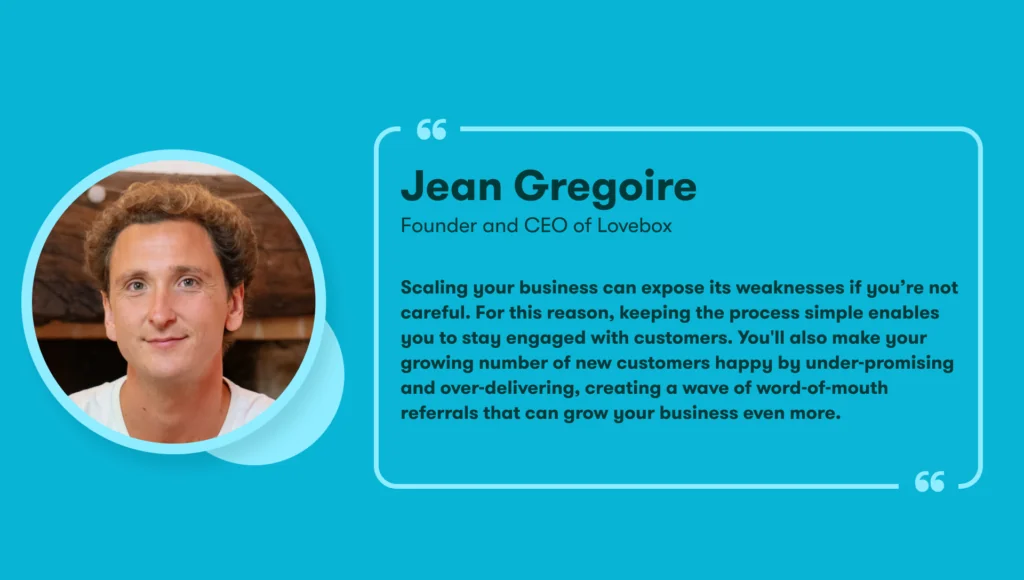
When companies aren’t able to live up to their promises, it harms their customer relationships. Bad reviews and unhappy customers can severely harm a business. That’s why Jean Gregoire, founder and CEO of Lovebox, an eCommerce company that sells a love note messaging device, recommends under-promising and over-delivering.
“Scaling your business can expose its weaknesses if you’re not careful,” he warned. “For this reason, keeping the process simple enables you to stay engaged with customers. You’ll also make your growing number of new customers happy by under-promising and over-delivering, creating a wave of word-of-mouth referrals that can grow your business even more.”
Customers that feel that you have surpassed their expectations are more likely to recommend your business and product to others. This is a great way to increase sales and keep customers coming back even during a recession.
37. Keep Overhead Costs Low
Keeping costs down during good economic times can help you when times are hard. It might be tempting to spend more to expand your business, but if you overextend yourself, you’ll run into trouble quickly during a recession.
“Instead of over-expanding your business during the good times, keep your overhead lower and your business on the leaner side,” advised James Green, owner of Cardboard Cutouts, an eCommerce company that sells life-size custom cardboard cutouts.
“You’ll be able to make it through the tough times more easily, while still providing quality products to your customers. If you can keep sales up, while keeping your overhead costs low, your profit margins will see you through the hard times without many changes.”
38. Automate and Streamline

Keeping costs down during good economic times can help you when times are hard. It might be tempting to spend more to expand your business, but if you overextend yourself, you’ll run into trouble quickly during a recession.
“Instead of over-expanding your business during the good times, keep your overhead lower and your business on the leaner side,” advised James Green, owner of Cardboard Cutouts, an eCommerce company that sells life-size custom cardboard cutouts.
“You’ll be able to make it through the tough times more easily, while still providing quality products to your customers. If you can keep sales up, while keeping your overhead costs low, your profit margins will see you through the hard times without many changes.”
38. Automate and Streamline

Instead of focusing on the struggles of a recession, you can use it as a great opportunity to improve your business operations. That’s what Hammad Afzal, growth marketing manager at MemoryClearance does. He works to scale his business, which sells a variety of IT hardware, during times of economic downturn as well.
“Scaling is not just a word for the good times,” he asserted. “It may be the best time to look for technologies and tools to automate simple tasks and streamline your business during a recession. Outsourcing certain tasks can also reduce your overhead. Marketing and finances are often outsourced to external agencies or freelancers.”
Automating and streamlining your business processes will help you during a recession and continue to be valuable when times are good as well. It’s an all around great way to cut costs and raise productivity.
A funding solution to recession-proof your business
Running an eCommerce business can be unpredictable. Your profits are subject to the ups and downs of the economy, supply chain delays and disruptions, and changing consumer buying patterns. Therefore, it’s a good idea to have a strategy in place so you can continue to succeed when times are tough.
Access to continuous, flexible capital can be a game changer for sellers, particularly during a recession. Sufficient capital can give your business the adaptability it needs to survive.
8fig offers customized Growth Plans to eCommerce sellers, tailored to their unique growth needs. 8fig funding is aligned to your supply chain, so you receive the capital you need right when you need it. We also understand the uncertainty of eCommerce, so our funding is quick and flexible. You can change your funding plan as often as you want, as sales rise and fall with the market.
If a funding plan can help you scale your business and prepare for a recession, sign up for a free 8fig Growth Plan today.
Subscribe to the eCommerce newsletter for
top industry insights
to our blog
Read the latest
from 8fig

Amazon Prime Day is one of the biggest selling events of the year. Here’s how sellers can prepare for Prime Day and maximize their profits.

AI is quietly reshaping eCommerce. Karma’s Hadas Bar-Ad explores how today’s sellers are using intelligent tools to streamline operations, boost efficiency, and drive smarter growth.

WhatsApp isn’t just for memes and group chats anymore. With a 98% open rate, it’s the secret weapon your eCommerce marketing strategy might be missing. Here’s how to do it right.
